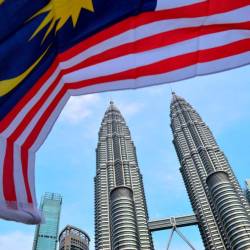UPDATE 6-U.S. rejects China's claims in S. China Sea, adding to tensions
(Adds analysts' comments, responses from Taipei, Manila; Changes date)
By Humeyra Pamuk and Arshad Mohammed
WASHINGTON, July 14 (Reuters) - The United States on Monday rejected China's disputed claims to offshore resources in most of the South China Sea, a move that Beijing criticised as inciting tensions in the region and which highlighted an increasingly testy relationship.
China has offered no coherent legal basis for its ambitions in the South China Sea and for years has been using intimidation against other Southeast Asian coastal states, U.S. Secretary of State Mike Pompeo said in a statement.
"We are making clear: Beijing's claims to offshore resources across most of the South China Sea are completely unlawful, as is its campaign of bullying to control them," said Pompeo, a prominent China hawk within the Trump administration.
The United States has long opposed China's expansive territorial claims on the South China Sea, sending warships regularly through the strategic waterway to demonstrate freedom of navigation there. Monday's comments reflect a harsher tone.
"The world will not allow Beijing to treat the South China Sea as its maritime empire," Pompeo said.
The Chinese embassy in Washington said the accusation is "completely unjustified."
"Under the pretext of preserving stability, (the U.S.) is flexing muscles, stirring up tension and inciting confrontation in the region," it said.
Analysts said it would be key to see whether others adopt the U.S. stance and what, if anything, Washington might do to reinforce its position and prevent Beijing from creating "facts on the water" to buttress its claims.
"The U.S. is trying to drive a wedge between China and its Southeast Asian neighbours," said Zhu Feng, executive director of China Center for Collaborative Studies of the South China Sea at Nanjing University.
The U.S. statement supports a ruling four years ago under the UN Convention on the Law of the Sea that invalidated most of China's claims for maritime rights in the South China Sea.
Philippines Presidential Spokesman Harry Roque said claims in the region should be resolved according to the Convention. "Our position here is we will pursue our national interest and resolving the South China Sea will have to be in accordance with the law," he said.
Taiwan's Foreign Ministry's welcomed the U.S. statement, and called for Taiwan's inclusion in a multilateral dispute mechanism. "Our country opposes any attempt by a claimant state to use intimidation, coercion, or force to resolve disputes in the South China Sea," spokeswoman Joanne Ou told reporters.
SWEEPING CLAIMS
The relationship between the United States and China has grown increasingly tense over the past six months over Beijing's handling of the coronavirus pandemic, its tightened grip on Hong Kong and its crackdown on China's Uighur Muslim community.
"After reading this statement, I'm less optimistic about China and the U.S. being able to prevent accidents on the South China Sea from escalating into armed conflict," said Wu Shicun, head of China Institute of South China Sea Studies.
China claims 90% of the potentially energy-rich South China Sea, but Brunei, Malaysia, the Philippines, Taiwan and Vietnam also lay claim to parts of it, through which about $3 trillion of trade passes each year. Beijing has built bases atop atolls in the region but says its intentions are peaceful.
Beijing routinely outlines the scope of its claims with reference to the so-called nine-dash line that encompasses about nine-tenths of the 3.5-million-square-kilometer South China Sea on Chinese maps.
"This is basically the first time we have called it illegitimate," said Chris Johnson, an analyst with the Center for Strategic and International Studies. "It's fine to put out a statement, but what you going to do about it?" (Reporting by Humeyra Pamuk, Arshad Mohammed, Matt Spetalnick, Daphne Psaledakis. Additional reporting by Yew Lun Tian in Beijing, Ben Blanchard in Taipei, and Karen Lema in Manila; Editing by Leslie Adler and Lincoln Feast.)






